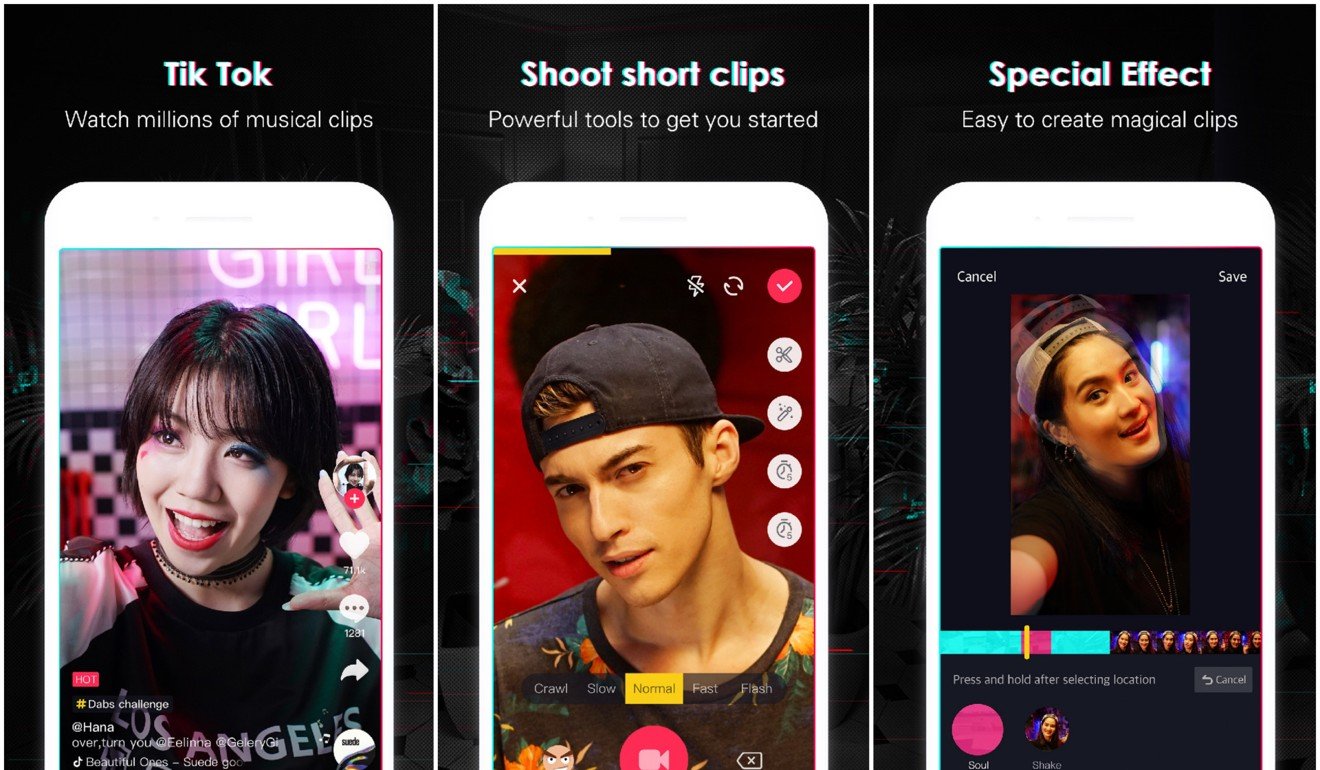
How short video app TikTok became the first Chinese-made app to take the world by storm
- TikTok is the first Chinese-made app to take the world by storm – putting it up there with the likes of US names such as Facebook, Snapchat, Instagram and YouTube
TikTok, the popular short video app owned by Beijing-based ByteDance, recently surpassed 1 billion installs globally on the iOS App Store and Google Play, becoming a hit in the US, Europe, India, and Southeast Asia.
The app, in which people dance, jump and lip sync to pop songs and music in 15-second shareable videos, was also the fourth-most downloaded non-game app last year and the No. 1 non-game app in the US in January, according to research firm SensorTower.
This makes it the first Chinese-made app to take the world by storm – putting it up there with the likes of US names such as Facebook, Snapchat, Instagram and YouTube.
YouTube’s most-followed star, PewDiePie, talks about TikTok on a daily basis in his videos.
TikTok’s overseas success – tapping the universal desire to sing and dance – stands out in China because even Tencent’s dominant messaging and social media platform WeChat has remained essentially a Chinese phenomenon only.
WeChat, a transactional super app in China with over a billion daily active users, allows users to chat, read, play games and order food online. It tried to expand outside its home market in 2012 – before TikTok {also known as Douyin in China] was born – but has been unable to replicate its domestic success.
“TikTok is a content platform first, then a social platform, which is different from WeChat,” said Xie Pu, founder of tech website Techie Crab. “Music and dance is an international language,” he added.
Xie also said one thing WeChat failed to do when it tried to push overseas was to localise, making it relevant to western consumers. “WhatsApp and Line were all early players in overseas markets before WeChat,” he added.
TikTok’s rise to international stardom has not been an overnight success story, and Bytedance has had to go through a trial and error process to finally crack overseas markets.
But ultimately its innovative and easy-to-use editing functions that allow users to customise videos with a variety of special effects have borne fruit.
TikTok has also had to deal with pressing privacy issues and calls to protect younger users – in line with the entire social media industry.
In 2018, Bytedance announced several feature upgrades as part an “ongoing effort to maintain a safe, healthy and creative environment for its global user community”. The additional features – including enhanced privacy settings, account deletion, private messaging access, and parental controls – went live last July.

The world’s most valuable unicorn is also the owner of hit Chinese news aggregator Jinri Toutiao, meaning “Today’s Headlines,” which recommends personalised news articles to people with different interests based on its AI-driven algorithms.
Bytedance specialises in applying AI and big data analysis to its products to better understand user behaviour and tastes, allowing them to be personalised.
Jinri Toutiao also has an overseas equivalent, TopBuzz, but it has not been as successful as the China app is in its home market, recently making No. 14 in US mobile news app rankings, according to SimilarWeb.
In the world of short video though, TikTok can be called a pioneer, and it has come a long way from modest beginnings.
“At the end of 2014, we hesitated about whether we should continue to work on short video,” said Zhang Yiming, founder and chief executive of Bytedance, on its 7th anniversary this month.
“We saw Tencent and Meipai posting ads on the subway and we saw Kuaishou already taking off. We thought we had already missed the short video trend and we weren’t sure if we had the energy to keep working on it.”
Two years later, Zhang said he realised he had to keep pushing on short video, not only domestically but also internationally. “I decided we also needed to make good acquisitions overseas,” Zhang added.
In February 2017, Bytedance acquired US video app Flipgram and later the same year bought lip-synching app musical.ly, which already had a strong following in the US. It also bought news app News Republic from Chinese mobile app developer Cheetah mobile.
Analysts attribute the rapid rise of TikTok globally, and in the US particularly, to its overseas acquisitions and the merging of musical.ly into TikTok.
“The [musical.ly] acquisition definitely gave TikTok a short cut for overseas expansion. It lowered the cost and reduced the difficulty of exploring new markets and fitting into a different culture,” said Zhang Yi, chief executive of research firm iMedia.
The difference between content and messaging is an important one though.
Users of Douyin and TikTok are walled off from each other to “avoid having problematic content created outside of China viewed by domestic audiences”, Samm Sacks, a China digital economy expert with New America, pointed out in a recent blog.

In contrast, WeChat users can send messages to each other wherever the app is downloaded, in Chinese or US app stores, but a Douyin user cannot watch videos posted on TikTok.
Being a hit in various regions also continues to draw the attention of a variety of local regulators, which is a huge challenge for TikTok, says iMedia’s Zhang Yi.
TikTok was last month slapped with a fine of US$5.7 million to settle claims by the US government that it illegally collected personal information from children under the age of 13, such as names, email addresses, and their location.
TikTok said in a statement that it is committed to “creating measures” to protect users, including tools for parents to protect their kids.
Popularity has its challenges but TikTok has broken new ground for China’s up-and-coming wave of technology start-ups.


